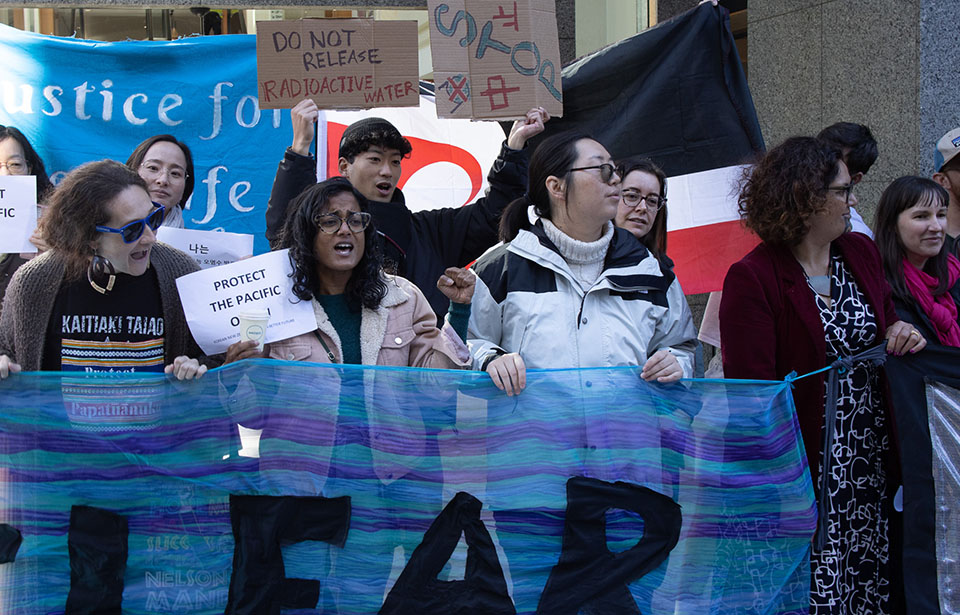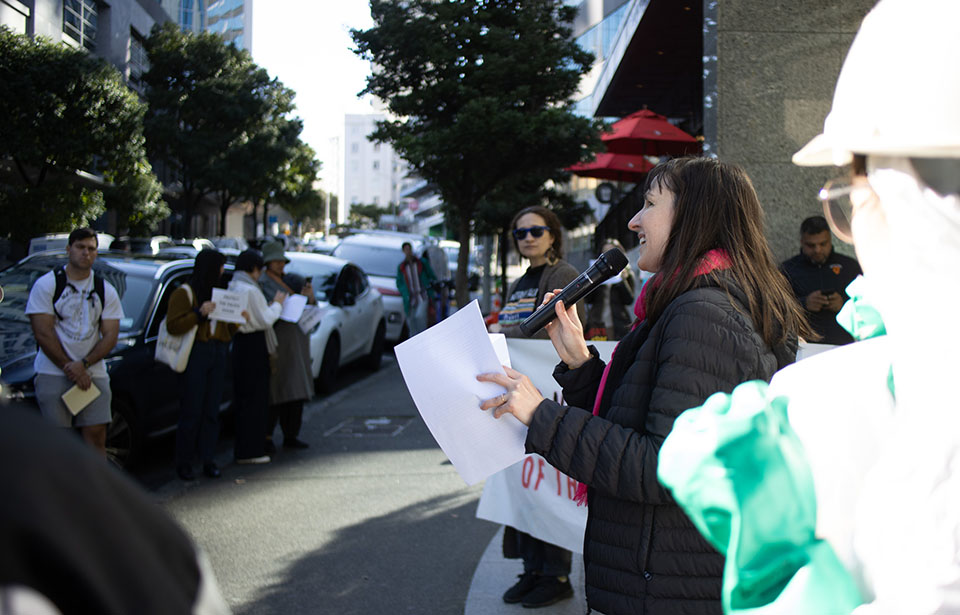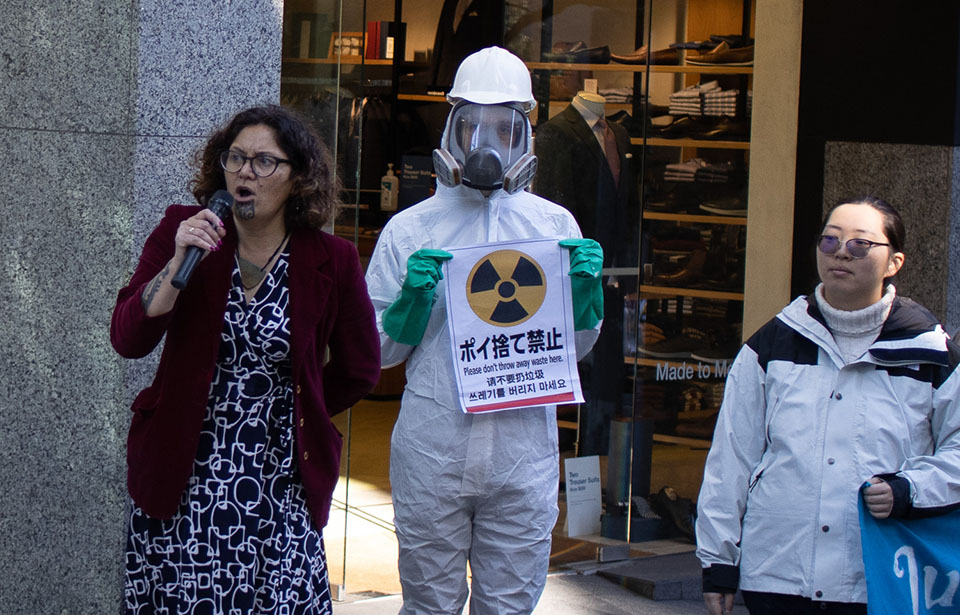'This is an international crime' - Japanese people join Auckland protest against dumping Fukushima’s nuclear wastewater
• August 28, 2023

Lynne Park, from Korea, joined the protest. Photo: Kexin Li
Protestors gathered outside the Japanese Consulate in Auckland on Friday after Japan last week started to dump 1.3 million tons of nuclear wastewater into the Pacific Ocean.
Protestors shouted "Nuclear-free Pacific” and speeches were delivered in English, Chinese Mandarin, Korean and te reo Māori by protesters.
Attendees at the small protest told TWN they were concerned about the potential damage to Pacific people caused by the wastewater and were attempting to raise New Zealanders’ awareness of the issue.
Some interviewees added their doubts over the official statements made by their respective home governments.
All three Japanese interviewed by TWN expressed their disagreement with what one called the “Japanese public’s indifference” towards the nuclear wastewater discharge.

Protestors outside the Japanese Consulate in Auckland. Photo: Kexin Li
A Japanese citizen, Soichiro, who arrived in Auckland a month ago for a working holiday, said he is was worried for his family and friends at home.
“There seems to be no panic among my family and friends. I believe that the apathy and irresponsibility of many Japanese people towards politics directly contribute to the release of this contaminated water.”
He protested outside the Japanese consulate on the day when Japan started the discharge, but didn’t get much support from Japanese New Zealanders.
Two other Japanese participants, Yuka iida and Yukiwada, also spoke of the “indifference” from Japanese society.
Yuka took part in social protests when she lived in Japan. She told TWN: “I feel like many Japanese are not interested in such social problems. The Japanese Government doesn’t want to listen to residents’ opinions either.”
Yukiwada, who has protested against wastewater releases in Japan many times, experienced the same things as Yuka. “Usually we do marching on the streets, but it seems like most people don’t care about it.”
Unsatisfied with these reactions, Soichiro said Japanese people must stand up to stop the release. “This is an international crime. I couldn’t stay still,” says Soichiro.

University of Auckland sociology lecturer Dr Karly Burch talks to the crowd. Photo: Kexin Li
Gao Yuan, one of the organisers of the protest, expressed her surprise at the silence of the New Zealand public and media to this event.
"All media attention goes to the election right now. Almost none of them are actually reporting on the wastewater release. This is absolutely the media's misconduct."
She read a statement from the China Atomic Energy Agency in Mandarin, regarding the Chinese Government’s opposition to the wastewater discharge.
"China, Japan, and Korea, we are like neighbours, and we will be affected the most. It only takes wastewater 240 days to reach China," Gao told TWN.
She said she did not support the decision by the International Atomic Energy Agency (IAEA) to allow the wastewater discharge. "I think the Japanese Government may have bribed them to release fake news. They claim it's safe, but it's nonsense."

Darleen Tana, a Green Party candidate for Tāmaki Makaurau. Photo: Kexin Li
Lynne Park, who came to New Zealand neighbouring South Korea, noted the silence of the New Zealand public on the wastewater discharge.
"New Zealand is a country opposing nuclear weapons, but it's really quiet this time. People around me don't think it's a big deal. So I try to join some activities and raise my voice."
On July 6, the South Korean Government announced that after a 22-month review by government-funded scientists in cooperation with the IAEA, they officially approved Japan's wastewater release plan.
Park read out that official announcement and some reports from South Korean media.
"Personally, I can't trust some information from the Korean Government. They told us the wastewater is safe. But if it's safe, why does the Japanese Government want to release it and dump it into the ocean? That's simple logic.
"The Earth is connected with the ocean. The Japanese Government will release water for 30 years, but during that time, they will produce more wastewater and release it again. It will have impacts, not only on Korea but all around the world, including New Zealand,"
Park said she attempted to make the New Zealand Government aware there was a feeling in Aotearoa against the decision.
New Zealander Ema I’u told TWN she had doubts about the consultation process through which IAEA allowed Japan to legally release the wastewater.
“Who gives those people the right to make decisions for the rest of the world? There is not enough information for everybody to understand these issues. I think there needs to be more consultation with communities that are affected who live in the Pacific,” said I’u.
Sophora, from Fridays for Future, shared similar concerns that the decision was made by a nuclear-power advocacy agency, rather than an environmental agency.
Wearing a radiation suit, Sophora told TWN that this would have to be her dress code for going to the beach.
Members of Fridays For Future also joined in another protest against the wastewater discharge held in Wellington at the weekend.
Jamie Quinton, Massey University 's head of the School of Natural Sciences, said he believed in the reliability of IAEA.
“I have no doubt that the panel and the IAEA will establish monitoring of radiation levels prior to, during and subsequent to any release of wastewater into the ocean.”
Dr Karly Burch, a lecturer in sociology at the University of Auckland, has been researching food-safety governance.
She told TWN that her years of experiences in Japan reminded her of the difficulties when publicly speaking about the problem there.
"There are a lot of accusations of being non-scientific, anxious, and spreading harmful rumours.”
She told gathered protestors it would be possible to file a case against Japan before the Internacional Tribunal for the Law of the Sea to stop the dumping.
However, David Krofcheck, a senior lecturer from the University of Auckland, said he thought the biggest threat from the wastewater had been removed.
“Cooling seawater and later groundwater started flowing through the destroyed Fukushima nuclear reactor in 2011.
"The first two years were the most dangerous time because long-lived heavy nuclei like cesium-137, strontium-90, and iodine-131 ended up in the atmosphere and ocean.”
According to Krofcheck, an advanced liquid processing system (ALPS) invented in 2013 became the solution to removing these deadly chemicals.
“Tritium and carbon-14 are naturally produced by high energy protons hitting nitrogen and oxygen nuclei in our atmosphere and landing in the world’s oceans, so they naturally exist in our bodies.
"It is important not to conflate the radiation from nuclear fission nuclei like cesium-137, strontium-90, and iodine-131, with the naturally occurring tritium and carbon-14. The latter two nuclei will always be in the environment," says Krofcheck.
As a response, Mio Otashiro, deputy consul-general from the Consulate General of Japan in Auckland, says office activities continued as usual, and she had no comment regarding the protest.

Whakatairanga ka tika, whakamaua ngaa mita
AISHA CAMPBELL (NGĀTI RUANUI, NGĀ RAURU, NGĀ RUAHINE, TE ATIAWA, TARANAKI) • October 28, 2025

Supporters hope new council will save Western Springs Speedway
Savannah Lendich Jonkers • October 8, 2025


Whakatairanga ka tika, whakamaua ngaa mita
AISHA CAMPBELL (NGĀTI RUANUI, NGĀ RAURU, NGĀ RUAHINE, TE ATIAWA, TARANAKI) • October 28, 2025

Supporters hope new council will save Western Springs Speedway
Savannah Lendich Jonkers • October 8, 2025
